
The World Court League was formed on December 30, 1915, with John Hays Hammond as president. They lobbied for the formation of the International Court of Justice. [1]

The World Court League was formed on December 30, 1915, with John Hays Hammond as president. They lobbied for the formation of the International Court of Justice. [1]
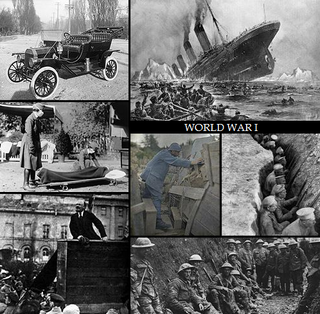
The 1910s was a decade of the Gregorian calendar that began on January 1, 1910, and ended on December 31, 1919. The 1910s represented the culmination of European militarism which had its beginnings during the second half of the 19th century. The conservative lifestyles during the first half of the decade, as well as the legacy of military alliances, was forever changed by the assassination, on June 28, 1914, of Archduke Franz Ferdinand, the heir presumptive to the Austro-Hungarian throne. The murder triggered a chain of events in which, within 33 days, World War I broke out in Europe on August 1, 1914. The conflict dragged on until a truce was declared on November 11, 1918, leading to the controversial, one-sided Treaty of Versailles, which was signed on June 28, 1919.

Robert Lansing was an American lawyer and diplomat who served as Counselor to the State Department at the outbreak of World War I, and then as United States Secretary of State under President Woodrow Wilson from 1915 to 1920. A conservative pro-business Democrat, he was pro-British and a strong defender of American rights at international law. He was a leading enemy of German autocracy and Russian Bolshevism. Before U.S. involvement in the war, Lansing vigorously advocated in favor of the principles of freedom of the seas and the rights of neutral nations. He later advocated U.S. participation in World War I, negotiated the Lansing–Ishii Agreement with Japan in 1917 and was a member of the American Commission to Negotiate Peace at Paris in 1919. However Wilson made Colonel House his chief foreign policy advisor because Lansing privately opposed much of the Versailles treaty and was skeptical of the Wilsonian principle of self-determination.

This section of the Timeline of United States history concerns events from 1900 to 1929.

Elihu Root was an American lawyer and statesman who served as the Secretary of State under President Theodore Roosevelt and as Secretary of War under Roosevelt and President William McKinley. He moved frequently between high-level appointed government positions in Washington, D.C. and private-sector legal practice in New York City. For that reason, he is sometimes considered to be the prototype of the 20th century political "wise man," advising presidents on a range of foreign and domestic issues. He was elected by the state legislature as a U.S. Senator from New York and served one term, 1909–1915. Root was awarded the Nobel Peace Prize in 1912.
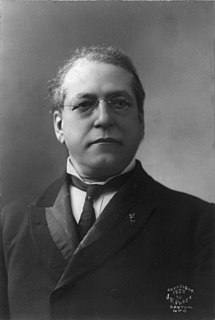
Samuel Gompers was a British-born American cigar maker, labor union leader and a key figure in American labor history. Gompers founded the American Federation of Labor (AFL), and served as the organization's president from 1886 to 1894, and from 1895 until his death in 1924. He promoted harmony among the different craft unions that comprised the AFL, trying to minimize jurisdictional battles. He promoted through organization and collective bargaining, to secure shorter hours and higher wages, the first essential steps, he believed, to emancipating labor. He also encouraged the AFL to take political action to "elect their friends" and "defeat their enemies". He mostly supported Democrats, but sometimes Republicans. He strongly opposed Socialists. During World War I, Gompers and the AFL openly supported the war effort, attempting to avert strikes and boost morale while raising wage rates and expanding membership.

John Kinley Tener was an American politician and Major League Baseball player and executive. He served as the 25th Governor of Pennsylvania from 1911 until 1915. A Republican, he had previously served as a U.S. Representative for Pennsylvania's 24th congressional district. During his baseball career, Tener played as a pitcher and outfielder for the Baltimore Orioles of the American Association, the Chicago White Stockings of the National League, and the Pittsburgh Burghers of the Players' League; after his playing career, he served as President of the National League.
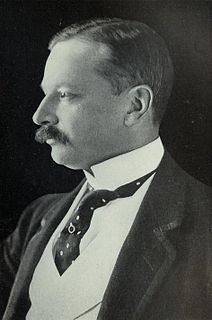
George von Lengerke Meyer was a Massachusetts businessman and politician who served in the Massachusetts House of Representatives, as United States ambassador to Italy and Russia, as United States Postmaster General from 1907 to 1909 during the administration of President Theodore Roosevelt and United States Secretary of the Navy from 1909 to 1913 during the administration of President William Howard Taft.
The American Boy Scouts (ABS), officially American Boy Scout then United States Boy Scouts, officially United States Boy Scout, was an early American Scouting organization formed by William Randolph Hearst in 1910, following on from the formation of the Scouting movement by Robert Baden-Powell between 1903 and 1907. Near the end of its existence, the organizations also used the names American Cadets and U.S. Junior Military Forces.
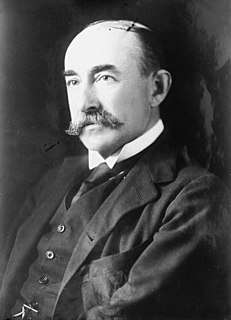
John Hays Hammond was an American mining engineer, diplomat, and philanthropist. Known as the man with the Midas touch, he amassed a sizable fortune before the age of 40. An early advocate of deep mining, Hammond was given complete charge of Cecil Rhodes' mines in South Africa and made each undertaking a financial success. He was a main force planning and executing the Jameson Raid in 1895. It was a fiasco and Hammond, along with the other leaders of the Johannesburg Reform Committee, was arrested and sentenced to death. The Reform Committee leaders were released after paying large fines, but like many of the leaders, Hammond escaped Africa for good. He returned to the United States, became a close friend of President William Howard Taft, and was appointed a special ambassador. At the same time, he continued to develop mines in Mexico and California and, in 1923, he made another fortune while drilling for oil with the Burnham Exploration Company. His son, John Hays Hammond, Jr., patented over 400 inventions, and is widely regarded as the father of radio control.

The American Defense Society was a nationalist American political group founded in 1915. It advocated American intervention against Germany during World War I as well as opposition to the Bolsheviks, who came to power in Russia after the October Revolution of 1917.

Dudley Vanness Sutphin was a prominent resident of Cincinnati, Ohio, a well-known attorney and judge, a French Legion of Honor medal winner, and an outstanding amateur tennis player.
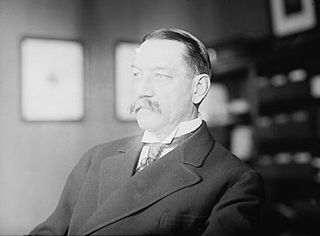
Henry Waters Taft was an American lawyer and author. He was the son of Alphonso and brother of President William Howard Taft. A renowned antitrust lawyer, he was a name partner at Cadwalader, Wickersham & Taft.

The National Security League (NSL) was an American patriotic, nationalistic, nonprofit, nonpartisan organization that supported a greatly-expanded military based upon universal service, the naturalization and Americanization of immigrants, Americanism, meritocracy, and government regulation of the economy to enhance national preparedness.
The Taft family of the United States has historic origins in Massachusetts; its members have served Ohio, Massachusetts, Vermont, Rhode Island, Utah, and the United States in various positions such as Governor of Ohio, Governor of Rhode Island, U.S. Senator (two), U.S. Representative (two), Attorney General, Secretary of War (two), United States Secretary of Agriculture, President of the United States, and Chief Justice of the United States.
Homer D. Call was an American labor leader and politician.

Charles Lathrop Pack, a third-generation timberman, was "one of the five wealthiest men in America prior to World War I". He owed his good start in life to the success of his father, George Willis Pack, and grandfather, George Pack, Jr. in the forestry sector. Growing up on Lake Huron in Michigan's Lower Peninsula, Charles L. Pack lived in Cleveland, Ohio, from 1871 to the early years of the 20th century. With "savvy investments ... in southern timber ... banking and real estate", Pack became a multi-millionaire. During World War I, he was a principal organizer and was heavily involved in the war garden movement in the United States.

The League to Enforce Peace was a non-state American organization established in 1915 to promote the formation of an international body for world peace. It was formed in Philadelphia by American citizens concerned by the outbreak of World War I in Europe. Support for the league dissolved and it ceased operations by 1923.
The following are some of the books and papers which have been written concerning William Howard Taft, 27th President of the United States:
The University of Notre Dame's annual commencement exercises are held each May, currently in the Notre Dame Stadium. The exercises award undergraduate and graduate degrees.